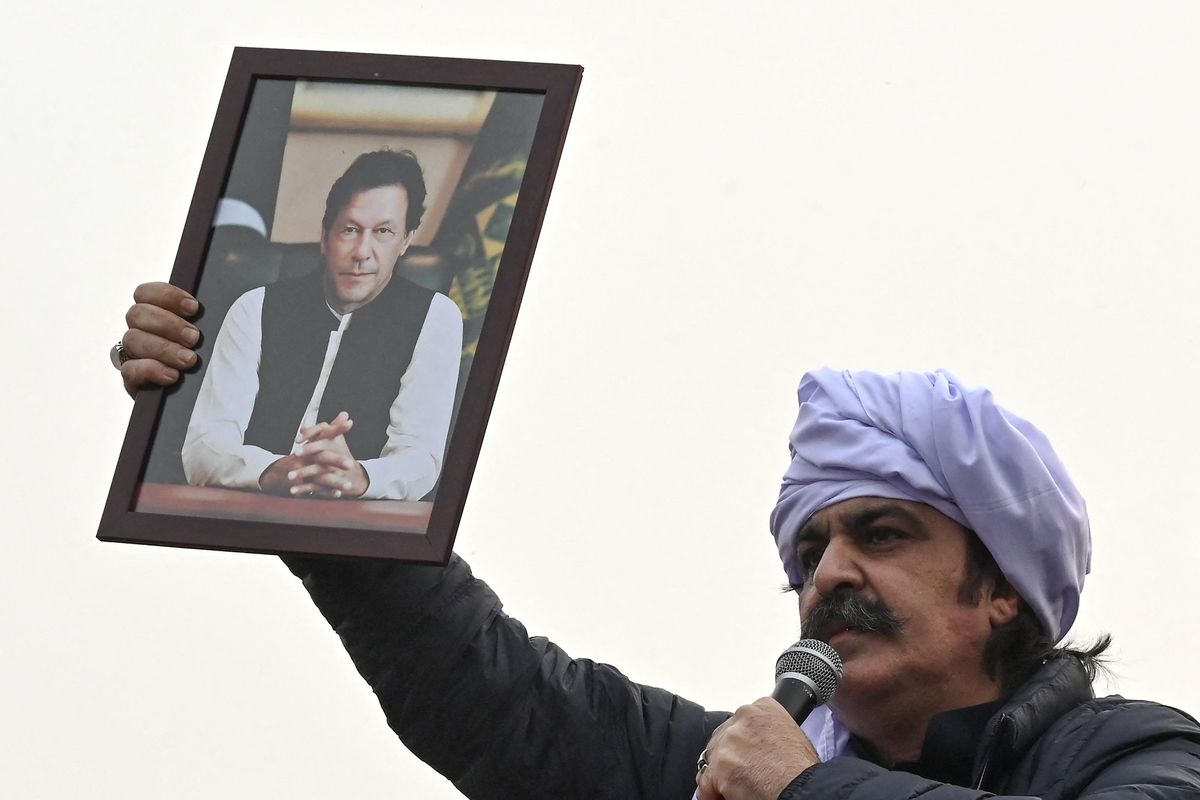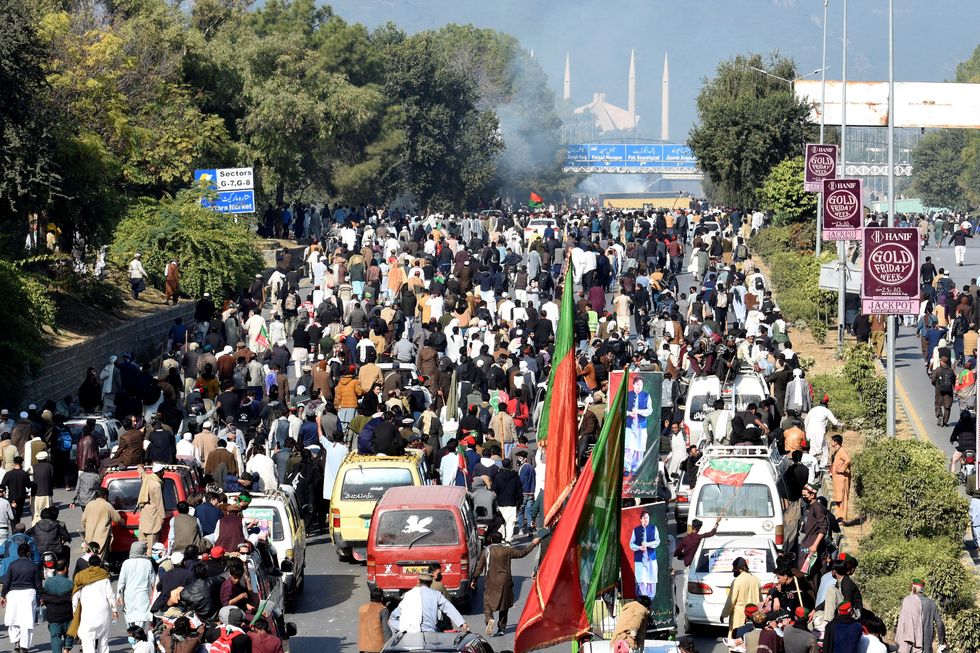Debate over Governor Rule in Pakistan’s KP resurfaces after Khan-led party's botched protest
Legal provisions allow Governor’s Rule in Khyber Pakhtunkhwa, but political and judicial challenges loom as tensions between govt and PTI escalate
Imran Kazmi
Senior Producer/Acting News Editor
Imran Kazmi is a seasoned digital journalist with nearly 15 years of experience in the media industry, including senior editorial roles at Pakistan’s leading news organisations.

Speculations rise following PTI's Islamabad protests and alleged misuse of state resources
Governor Kundi calls for an All Party's Conference to address KP's law and order challenges, rejects Governor’s Rule
Article 234 allows federal intervention if provincial governance collapses, with parliamentary approval
Experts warn imposing Governor's Rule may politically benefit PTI despite coalition's majorityEver since the PML-N-led coalition government took office following February’s controversial elections in Pakistan, the idea of imposing Governor's Rule in PTI-ruled Khyber Pakhtunkhwa (KP) has been a recurring topic of discussion.
Governor's Rule refers to a situation where the federal government suspends the normal functioning of a provincial government and the Governor of the province assumes executive authority.
Tensions between the ruling coalition and jailed former Prime Minister Imran Khan’s party - the Pakistan Tehreek-e-Insaf (PTI) -have simmered since Khan’s ouster in 2022.
These tensions escalated further after a botched PTI protest in Islamabad this week. KP Chief Minister Ali Amin Gandapur, who led the protest convoy with Khan’s wife, Bushra Bibi, is again under fire for allegedly using state resources and machinery for the march.
'Where is Gandapur?' PTI protesters question KP CM's commitment to rally. www.youtube.com
Following the deadly protests, Islamabad was rife with speculation about the imposition of Governor Rule in KP.
During a federal cabinet meeting on Thursday, the suggestion was floated by a lone minister. The minister argued that Gandapur’s actions, including repeated "attacks" on the federal capital, justified the move. However, the proposal failed to gain significant support, and no decision was made.
Meanwhile, KP Chief Minister Ali Amin Gandapur has said that he cannot be intimidated by talks of Governor’s Rule. "We are not afraid of Governor's Rule," he said while addressing the KP Assembly on Friday night. "Let them impose Governor’s Rule if they wish… it won't intimidate us. An emergency won't scare us either."
Mixed signals from KP’s governor
Speaking at a joint press conference with Awami National Party (ANP) leader Aimal Wali Khan, KP Governor Faisal Karim Kundi on Friday denied any decision had been made regarding imposing the rule. He said no formal discussions had taken place with him on the matter.
Criticizing the provincial government, Kundi said, “Bloodshed continues in the province, while the provincial government is busy setting fires in Islamabad.” He expressed concern over the deteriorating law and order situation and announced plans to convene an all-parties conference (APC) to tackle security challenges, particularly in the troubled Kurram region.

Kundi also accused the PTI of using provincial resources to support Khan’s release and alleged that Punjab-based PTI leaders had taken refuge at the Chief Minister’s House in KP. Both Kundi and Wali agreed that political unity and resource protection, rather than authoritarian measures like Governor’s Rule, were key to resolving KP’s issues.
Prime Minister’s Adviser Rana Sanaullah echoed concerns about the political consequences of imposing the rule.
“Discussions have taken place, but the final decision rests with the Prime Minister,” he said. He added that arrests or Governor’s Rule at this time would only benefit the PTI politically.
Past proposals
The idea of imposing this rule in KP is not new. Following February’s elections, PPP leader Qamar Zaman Kaira was among the first to propose it after PTI’s Asad Qaiser urged Gandapur to sever ties with the federal government.
In March, Kaira said the Constitution allowed Governor’s rule in “exceptional circumstances”.
In May, President Asif Ali Zardari dismissed the idea during a meeting with Governor Kundi, urging cooperation instead. However, Kundi criticized the provincial government for worsening law and order, even as he pledged to support the people of KP.
The issue resurfaced in July when Kundi again ruled it out but condemned the provincial government’s failure to address constitutional responsibilities.
- YouTube www.youtube.com
In September, Federal Minister Amir Muqam said the federal government might consider imposing the rule as a last resort if governance and security in KP did not improve. Muqam accused Gandapur of prioritizing public rallies over law and order and criticized his offer to negotiate with the Afghan government, calling it beyond his mandate.
Speculation about the rule reignited in October when CM Gandapur led PTI supporters to Islamabad. A meeting between Governor Kundi and PM Shehbaz Sharif further fueled rumors, but Kundi dismissed the idea, stating he did not want to turn PTI “from a political orphan to a political martyr.”
Is Governor’s Rule possible after 18th Amendment?
Article 234 of the Constitution, titled “Power to issue proclamation in case of failure of constitutional machinery in a province,” outlines the process for imposing the rule.
According to Article 234, the president can “assume to himself, or direct the governor of the province to assume on behalf of the president, all or any of the functions of the government of the province, and all or any of the powers vested in, or exercisable by, anybody or authority in the province, other than the provincial assembly.”
Such a proclamation has a time limit of two months and must be ratified by a joint session of both houses of parliament within 10 days.
Legal expert's perspective
Speaking to Nukta, Ahmed Bilal Mehboob, Executive Director of PILDAT, explained that imposing Governor's Rule in KP is legally and constitutionally possible despite PTI’s majority in the provincial assembly.
“Chapter 10 of the Constitution deals with emergencies. Six articles, from 232 to 237, address such situations, but the most relevant is Article 234. It states that if the president receives a report from a provincial governor indicating the province’s affairs cannot be run according to constitutional provisions, the president can proclaim an emergency in that province.
"Within 10 days, this proclamation must be endorsed by both houses of parliament separately. Under Article 234, the provincial assembly can continue functioning, but any law passed by parliament will take precedence.
“This proclamation must then be presented to a joint session of parliament within 30 days. Its validity lasts two months, but before it lapses, the joint session can extend it for another two months. In total, this emergency provision can remain in effect for up to six months. During this period, the executive powers of the chief minister are exercised either by the president or the governor.
“So yes, legally and constitutionally, it is possible. Given the ruling coalition’s two-thirds majority in parliament, this would not be difficult to implement.”
Political ramifications
Mehboob however highlighted potential challenges. “The major question is the political ramifications of such a decision. Whether the government can manage the fallout is a separate issue. Politically, I do not think it is advisable at this time, though constitutionally it is feasible,” he remarked.
“Historically, such proclamations have often been declared unlawful and overturned by superior courts. The government will need a strong case to defend its decision in court. It remains to be seen whether they can substantiate the necessity of this move.”
While the legal framework supports imposing the rule, the political and judicial consequences could be significant, adding further complexity to an already volatile situation in Khyber Pakhtunkhwa.






Comments
See what people are discussing